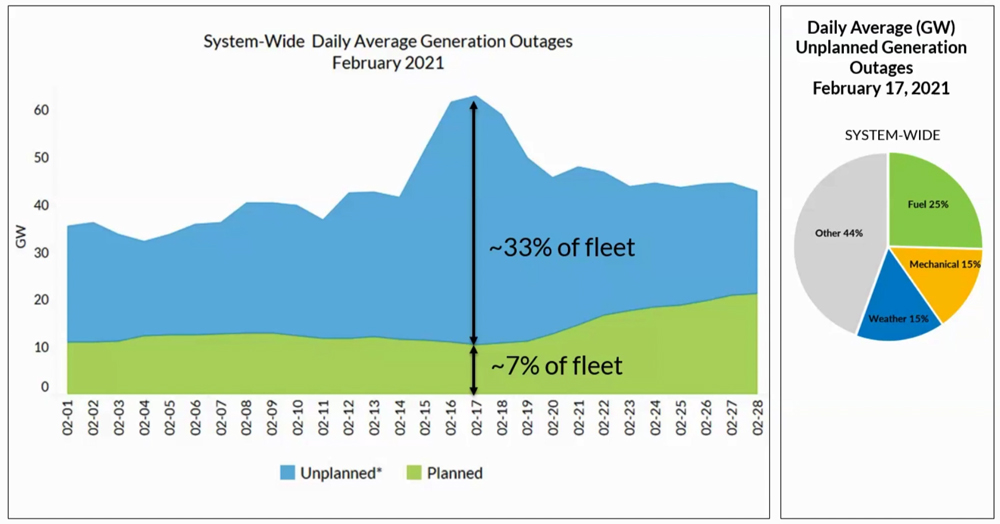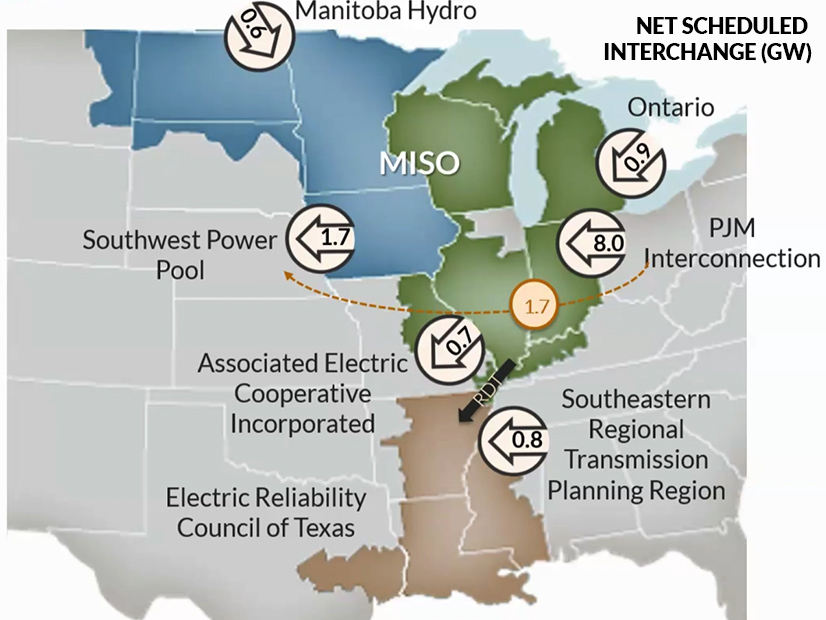At a webinar on cold weather preparedness hosted by SERC Reliability and ReliabilityFirst on Tuesday, Trevor Hines, MISO’s manager of reliability coordination for its South region, emphasized that while the RTO has been diligent about learning from February’s cold-weather event and subsequent mass outages, there is still much work to be done implementing its lessons.
“You’ll hear a theme here, as far as things that we need to make sure we’re incorporating into our planning process, [that] being these unprecedented or extreme events,” Hines said, adding that MISO staff have described the events of February as a “once in a career event” for which no training had ever prepared them.
The exceptional circumstances went beyond the weather; MISO’s report on the February events identified a number of unusual occurrences. For example, the normal west-to-east flow of energy across the MISO footprint reversed during the winter crisis, as the cold weather moving across the U.S. led to increased demand for energy in the Midwest while temperatures remained higher in the East.
This only proved temporary, as the cold weather continued to spread east as the week went on and eastern generating resources became more thinly spread. MISO began to experience “operational challenges,” leading the RTO to exercise its emergency procedures, including load shed.

“As we all know, this is not an easy decision to make for a system operator. … They are very aware of what the impact is of having to do this in the middle of a cold-weather event,” Hines said. “The processes did work; we did not have any uncontrolled loss of load due to impacts [to] the transmission system. But we did have to make some hard decisions [to] keep the system reliable.”
One reason the system operators had to make relatively quick decisions was that their training had never addressed handling east-to-west energy flows; Hines said this was because “current emergency load-shed plans are focused primarily on summer needs.”
Another lesson from the cold snap is the need for “a unified communication or story to tell” when a mass event is affecting multiple areas at once.
“We are all on the same page trying to ensure the reliability of the bulk electric system during events like this; we should all be able to have a similar story as to what the impacts are and why we experienced those impacts,” Hines said.
While MISO’s report discussed the role of a common communication strategy in avoiding “negative press, concern from legislators and regulators, and ultimately customer frustration,” Hines noted a further benefit to having designated communication staff: the ability to keep critical personnel focused on their jobs.
“We have system operators … who were pulled into a lot of conversations, whether that be with the press [or] upper management, asking questions about what’s going on … and at times that would take away the subject matter experts from their duties of focusing on the reliability of the bulk electric system,” Hines said.
Cold Snap Takes Stage at MRO
With winter inching closer, the Midwest Reliability Organization’s annual reliability conference on Tuesday also focused on February’s big chill.
Oklahoma Gas and Electric Director of System Operations Dallas Rowley joked that the emphasis on the mid-February load shedding remains a “cold topic,” rather than a hot one.
“Firefighters have to prepare for heat. For system operations, it’s been a little hot,” SPP Director System Operations C.J. Brown said, adding that the RTO is readying plans for the 2021 winter. “The fact is extreme weather is here to stay.”
Brown said the February event’s duration is what set it apart from other challenging operations. “In my 20 years, I’ve seen some rough days; I’ve seen some rough weekends. I’ve never seen a situation where we couldn’t get our [balancing authority] healthy for so long. We were on the edge of seats for the better part of a week.”
He said the cold snap will irrevocably change planning forecasts and resource adequacy prep work. The success story coming out of the event, Brown said, is MISO and SPP’s coordination on imports and transmission capacity as the cold and ice persisted.
Foundation for Resilient Societies founder Thomas Popik, whose consumer advocate nonprofit focuses on reliability, said ERCOT’s major blackouts in mid-February have knock-on effects for MRO.
Popik said wind generation, at 120,000 GWh in 2019, makes up more than a quarter of MRO’s nameplate capacity and is second only to coal’s nearly 35% share of capacity. He said MRO and ERCOT share a similar fleet makeup.
“All resources can underperform in tandem,” he said, adding that it was “unfortunate” that political leanings led some to blame the ERCOT load shed on renewable resources. He said aging coal plants can be quick to trip offline in underfrequency conditions brought on by extreme weather.
“If you already have 30 years of life in turbine blades, do you want to risk vibrations? It might be prudent to take a forced outage for the day,” he said.
But Popik said ERCOT’s single greatest failure during the event was not having a more detailed load-shed plan that prioritized critical infrastructure like hospitals and the electric compressors that pressurize natural gas supply.
“You have to have really good plans for what the prioritization is,” he advised.
Popik also cautioned that NERC’s N-1 contingency definition assumes failures are random and aren’t correlated, as they tend to be in extreme weather events.
Popik said though ERCOT operators received flak for ordering load shed, he considers them “heroes.” He said their targeted load shedding averted underfrequency load shedding and total system collapse. With several black start units on forced outage at the time, “it could have been days, weeks, months before a full restoration in ERCOT,” he said.
“It’s unfortunate the heat the operators took,” Brown agreed. “Even in SPP, we had [members] of the public calling in to the control room. Somehow, they got the number. They thought it would be helpful. It was not helpful. … We need to do a better job of educating what it takes to manage the grid.”
MISO Executive Director of Systems Operations Renuka Chatterjee told the MRO Board of Directors that summer peak planning is no longer an acceptable standard.
“Professionally, I don’t have an opinion on climate change. But there are more extreme weather events within a year,” she said.
Chatterjee said that rather than one single strategy, MISO will need new flexibility products, commitments made days in advance and digitized load that can be calibrated up or down depending on system needs.
“We can say [in the] future, but I think the future is upon us,” she said. “This is, I think, the energy industry’s moment. … In many ways, we’re electrifying the same grid with different fuel. We’re learning to operate with more wind, more solar.”
Chatterjee recommended audience members read “The Last Days of Night,” Graham Moore’s historical thriller about the current wars during the 1890s.
“It’s interesting for me to compare the people and attitudes of those times with the current effort to re-electrify America with new fuels,” she said.
Chatterjee said MISO’s growing workforce is emblematic of the transformation. She said she remembered a time when one pizza order could cover the RTO’s staff at the turn of the millennium. Now, the RTO’s employees number more than 1,000.




